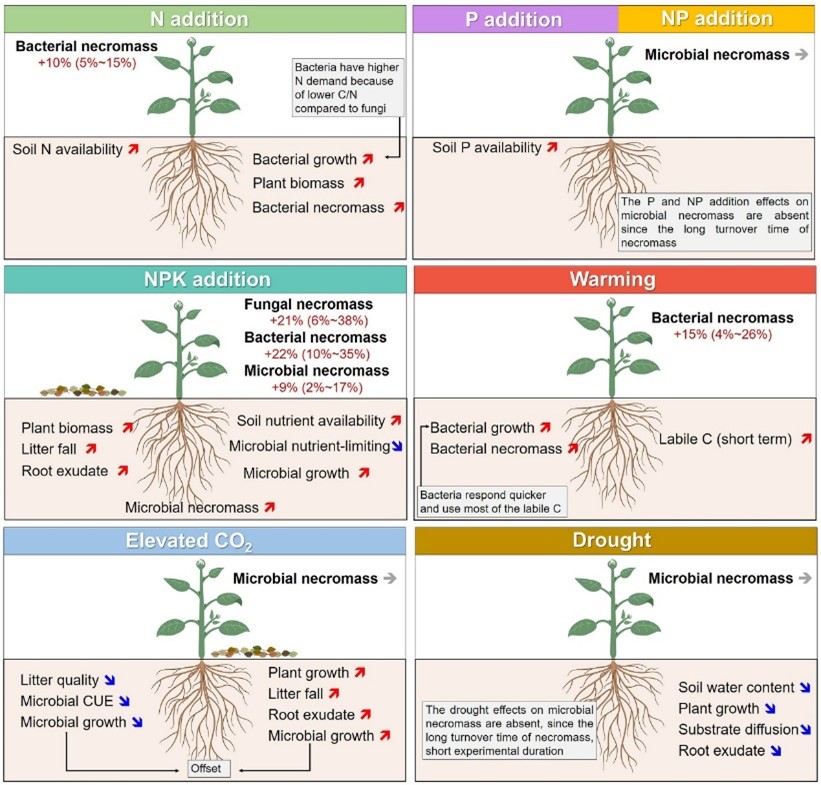March 19, 2023 | Global Change Biology |
Microbes play a crucial role in soil health and the cycling of carbon and nutrients. One important aspect of these microbes is their "necromass," the remains of dead microorganisms that contribute to soil organic matter. However, the impacts of global changes on microbial necromass are not well understood. Researchers from Sichuan Agricultural University and Vrije Universiteit Amsterdam conducted a study to investigate this relationship.
Their findings revealed that factors like nitrogen, phosphorus, and potassium inputs from human activities, climate warming, elevated carbon dioxide levels, and periodic drought significantly affect soil microorganisms and the formation of microbial necromass. They discovered that adding nitrogen along with phosphorus and potassium increased the content of fungal and bacterial necromass, leading to increased soil organic matter. Interestingly, warming temperatures favored bacterial growth over fungi, as bacteria thrive in higher temperatures. However, other global change factors had minimal effects on microbial necromass.
This study highlights the critical role of microbial necromass in soil health and its response to global changes. Further research is needed to understand the specific responses of bacteria and fungi to nitrogen addition and warming, as well as the contribution of microbial necromass to soil organic matter under different fertilization practices. By unraveling these relationships, we can better protect our soils and mitigate the effects of climate change (Read more).
Microbes play a crucial role in soil health and the cycling of carbon and nutrients. One important aspect of these microbes is their "necromass," the remains of dead microorganisms that contribute to soil organic matter. However, the impacts of global changes on microbial necromass are not well understood. Researchers from Sichuan Agricultural University and Vrije Universiteit Amsterdam conducted a study to investigate this relationship.
Their findings revealed that factors like nitrogen, phosphorus, and potassium inputs from human activities, climate warming, elevated carbon dioxide levels, and periodic drought significantly affect soil microorganisms and the formation of microbial necromass. They discovered that adding nitrogen along with phosphorus and potassium increased the content of fungal and bacterial necromass, leading to increased soil organic matter. Interestingly, warming temperatures favored bacterial growth over fungi, as bacteria thrive in higher temperatures. However, other global change factors had minimal effects on microbial necromass.
This study highlights the critical role of microbial necromass in soil health and its response to global changes. Further research is needed to understand the specific responses of bacteria and fungi to nitrogen addition and warming, as well as the contribution of microbial necromass to soil organic matter under different fertilization practices. By unraveling these relationships, we can better protect our soils and mitigate the effects of climate change (Read more).

Graphical summary of the main processes of global change effects on the bacterial, fungal, and total microbial (bacteria plus fungi) necromass. Red arrows indicate positive effects (increase), blue arrows represent the negative effects (decrease), and grey horizontal arrows show absence of changes (no effects). CUE, carbon use efficiency. Created with BioRender (https://biore nder.com/).





